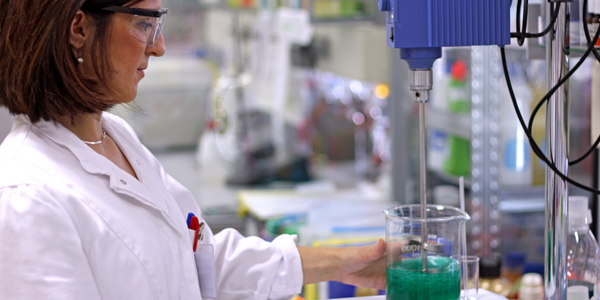Big Data as a Science: UK Chemistry Society Unlocks 170 Years’ Worth of Data with the Power and Flexibility of MarkLogic

公司规模
1,000+
地区
- Europe
国家
- United Kingdom
产品
- MarkLogic Enterprise NoSQL database
技术栈
- NoSQL
- XML
实施规模
- Enterprise-wide Deployment
影响指标
- Digital Expertise
- Productivity Improvements
技术
- 应用基础设施与中间件 - 数据库管理和存储
适用行业
- 化学品
适用功能
- 产品研发
服务
- 系统集成
关于客户
Founded over 150 years ago in the United Kingdom, the Royal Society of Chemistry (RSC) is Europe's largest organization dedicated to furthering awareness of the chemical sciences. With more than 48,000 global members, the RSC is the heir and successor of four renowned and long-established chemical science bodies-The Chemical Society, The Society for Analytical Chemistry, The Royal Institute of Chemistry, and The Faraday Society. The RSC's headquarters are in London and Cambridge, UK with international offices in the USA, China, Japan, India and Brazil. To strengthen knowledge of the profession and science of chemistry, the RSC holds conferences, meetings, and public events, and also publishes industry-renowned scientific journals, books and databases. Adding to its wealth of content, the RSC recently acquired the rights to The Merck Index, a renowned reference book used by industry professionals for over 120 years.
挑战
The Royal Society of Chemistry (RSC) had been gathering millions of images, science data files and articles from more than 200,000 authors since the 1840s. All of this information was stored in a wide range of formats at multiple locations and was growing by the day. In 2010, largely due to the huge growth of social media and digital formats, the RSC launched an initiative to make its data more accessible, fluid and mobile. They needed an integrated repository that would make all of their content accessible online to anyone-from teachers to businesses to researchers. The key was finding the right technology.
解决方案
After evaluating several major providers, the RSC chose MarkLogic as the best platform for its needs, and built three sites on it: RSC Publishing, Learn Chemistry, and Chemistry World. Given the society’s wide range of information media— books, emails, manuals, tweets, metadata, and more—the data does not conform to a single schema, which means a traditional relational database can’t accommodate it. MarkLogic’s document-based data model is ideal for varied formats and hierarchical metadata. The RSC can simply load its information as-is, without having to conform to a rigid format. MarkLogic offers many key benefits, including the ability to store content as XML documents. The database also enables logical associations between different types of content. Each image, video, and article is automatically tagged, allowing users to find, understand, and process the information they need.
运营影响
数量效益

Case Study missing?
Start adding your own!
Register with your work email and create a new case study profile for your business.
相关案例.

Case Study
Honeywell - Tata Chemicals Improves Data Accessibility with OneWireless
Tata was facing data accessibility challenges in the cement plant control room tapping signals from remote process control areas and other distant locations, including the gas scrubber. Tata needed a wireless solution to extend its control network securely to remote locations that would also provide seamless communication with existing control applications.

Case Study
Advanced Elastomer Systems Upgrades Production
In order to maintain its share of the international market for thermoplastic elastomers AES recently expanded its Florida plant by adding a new production line. While the existing lines were operating satisfactorily using a PROVOX distributed control system with traditional analog I/O, AES wanted advanced technology on the new line for greater economy, efficiency, and reliability. AES officials were anxious to get this line into production to meet incoming orders, but two hurricanes slowed construction.
Case Study
Wireless GPS Tracking & Security Monitoring
Enhancing the security of hazardous freight and ensuring compliance with Homeland Security’s Transportation Security Administration mandate that all trains carrying chemicals capable of creating a toxic inhalation condition are equipped with on-board safety monitoring systems.

Case Study
Field Device Asset Management For Chemical Company in China
Chinese chemical subsidiary of multinational corporation serves customers throughout the world. Sales offices and research and technology centers are strategically located to provide rapid response to customer requests. Just two workers were assigned to maintain thousands of intelligent instruments in three production units, so they could do little more than react to device issues as they appeared. This costly maintenance method inevitably led to unexpected downtime when a critical instrument failed. Plant management recognized the need to change from reactive to predictive maintenance for all assets, including instruments and control valves, but help was needed in implementing such a technology-based initiative.

Case Study
Industrial Workforce Mobility for Improved Safety & Operations
Huntsman Corporation, a global manufacturer and marketer of differentiated chemicals, undertook an aggressive program to eliminate injuries, product defects, and environmental releases at their Port Neches facility. Termed “Project Zero”, this program required a completely mobile solution to empower operations and maintenance personnel to capture defects, track work progress and make process and safety related decisions in real-time.



